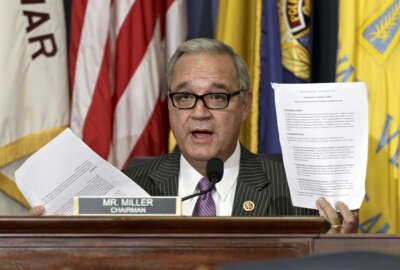
Touting 2 years of progress, McDonald hopes Trump will continue VA transformation
More veterans trust the department now than they did two years ago, the Veterans Affairs Department said in a new report detailing its progress on Secretary Bob...
In his final days in office, Veterans Affairs Secretary Bob McDonald said more veterans trust the department now than they did two years ago.
About 60 percent of veterans say they trust VA to fulfill its commitments to veterans, up from 47 percent six months ago, according to a departmental survey. More veterans — 74 percent compared to 65 percent a year ago — say they get the services they need.
The results come from a new report from the department, which details VA’s progress on delivering health care and other services to veterans under McDonald’s myVA Transformation strategies.
“Things are moving in the right direction,” McDonald said during a Washington Post event one day before Veterans Day. “My suggestion to the next president would be ‘please keep it going, if not accelerate the progress.'”
McDonald didn’t expound much further on the incoming Trump administration, instead taking the time to describe other areas where the department has improved.
By March, VA completed 5.3 million appointments within the department — 730,000 more than it two years ago, the report said. It’s issued twice as many authorizations, 268,000 of them, for veterans to receive care outside VA since 2014.
The department’s network is 45 percent larger than it was last year with 350,000 community providers.
About 22 percent of veterans’ appointments were completed on the same day, while 85 percent were completed within seven days and 96 percent done within 30 days, the report said.
VA’s disability backlog is also down this year, McDonald said. The department processed 1.3 million claims in 2016, which took an average of 123 days to complete. That processing time has actually dropped 65 percent in recent years, the report said.
“Because we’ve done such a good job driving down the disability claim backlog, the number of appeals have gone up,” McDonald said. “The number of appeals is relatively constant at 10 to 11 percent of all decisions made, but as you go from 950,000 claims dealt with to 1.6 million, which is what we have today, that 10-11 percent is a higher absolute number.”
Veterans of Foreign Wars Commander Brian Duffy also said he hopes VA will find a way to bring the appeals backlog down.
“We’re happy that the initial benefits package has been worked down, but we want them to work now with the same due diligence on bringing down the appeals,” he said during a Nov. 10 press conference in Washington. “We think a lot of resources were obviously diverted on the initial claims.”
McDonald took perhaps one last opportunity to push lawmakers to pass a few pieces of key legislation before the 114th Congress leaves and 115th takes its place, but it’s unclear what the lame-duck will get done.
“The fact now that we have one party that’s controlling the executive [branch] and the House and the Senate, I would hope in regards to the veterans legislation … that would bode well,” Duffy said. “But time will tell.”
Future of VA
In the last 10 weeks, McDonald said he’s “running toward the finish line” on his 12 priorities and five transformation strategies. The department sees them as viable plans for the next administration to continue.
“The five strategies described in our MyVA Transformation are timeless, business-savvy principles that will achieve our vision over the long term,” the VA report said.
Duffy said the VFW hopes the incoming administration will show “action, patience and clarity” in working with VA.
President-elect Trump has spoken of his desire to “make VA great again” on the campaign trail, and he lists 10 ways he plans to reform the department on his website. Half of those points specifically mention VA employees.
“Use the powers of presidency to remove and discipline the federal employees and managers who have violated the public’s trust and failed to carry out the duties on behalf of our veterans,” Trump’s plan reads.
In many ways, Trump’s plan reflects his propensity and experience as a businessman to hold poor performers accountable.
“Stop giving bonuses to any VA employees who are wasting money, and start rewarding employees who seek to improve the VA’s service, cut waste and save lives,” the plan said.
Several may sound similar to proposals members of Congress have already introduced.
For example, Trump wants Congress to pass legislation that empowers VA secretary to discipline or fire any employee who “jeopardized the health, safety or well-being of a veteran.”
The House passed similar legislation in September. And McDonald himself has expressed a similar desire for more authority to discipline poor performing senior executives and supports somewhat scaled back, alternate legislation from the Senate.
VA leadership was particularly frustrated this past year, after the Merit Systems Protection Board overturned punishments for three senior executives.
“The point is, that’s the law,” McDonald said. “If Congress would like that to be changed, they should change the law. But in changing the law, don’t just change the law for the VA, because what that does is put us at a disadvantage in hiring in the federal government and makes us uncompetitive with private industry, change the law for the federal government.”
Read the latest news about the incoming administration on our Tracking the Transition page.
Copyright © 2024 Federal News Network. All rights reserved. This website is not intended for users located within the European Economic Area.
Nicole Ogrysko is a reporter for Federal News Network focusing on the federal workforce and federal pay and benefits.
Follow @nogryskoWFED
Related Stories






